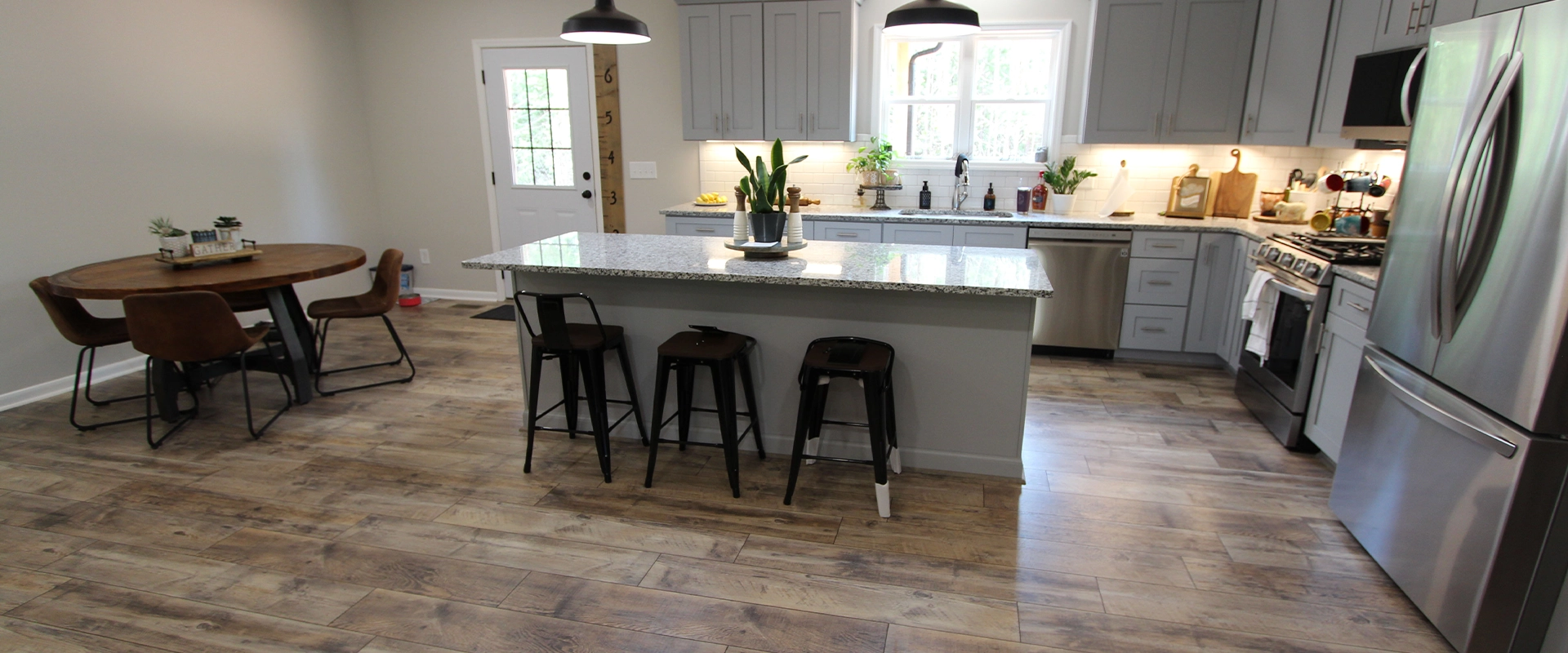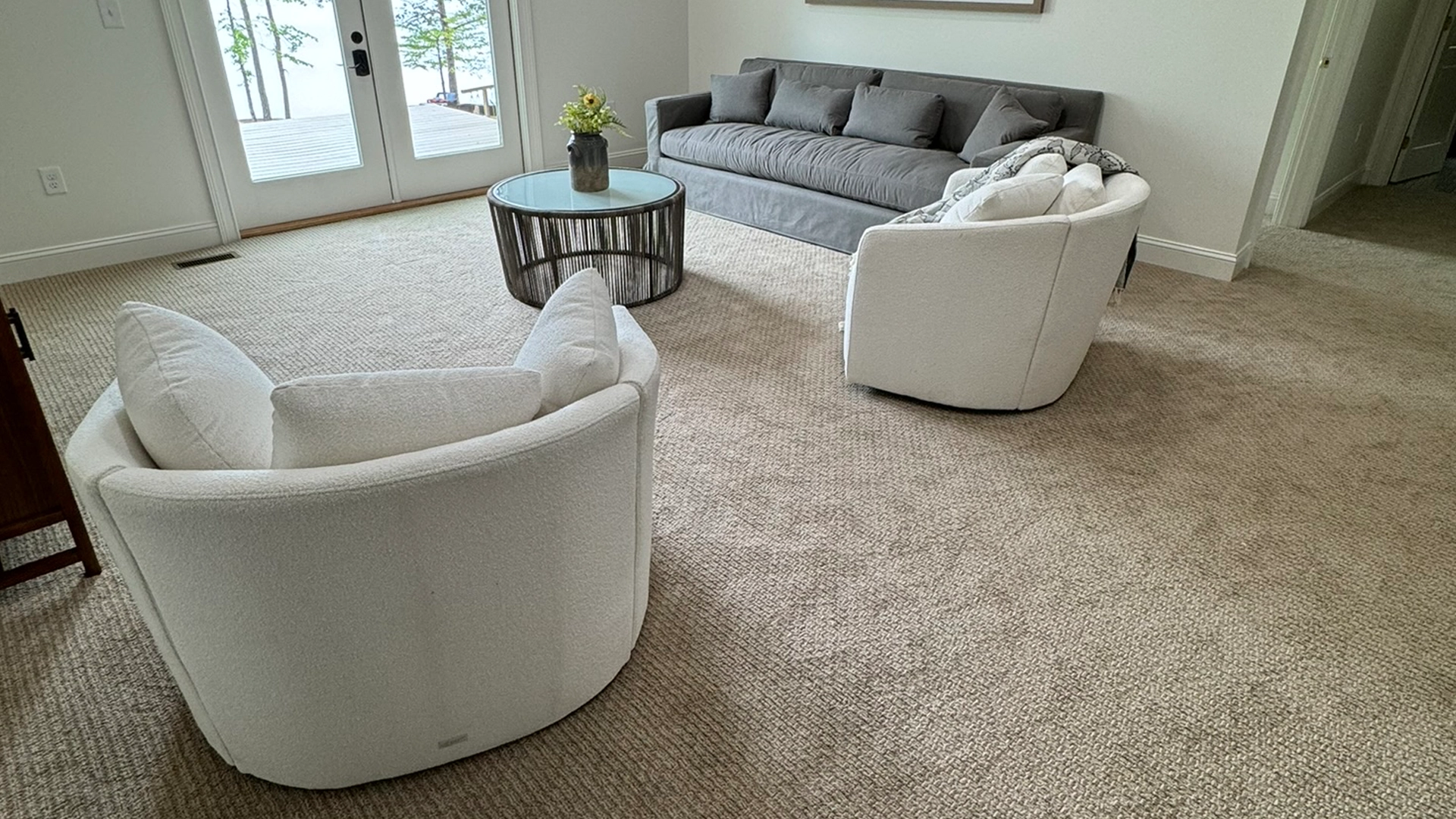
Finding Your Perfect Floor
Finding Your Perfect Floor: Comparing Hardwood, Laminate, Tile, LVT, and Carpet. Selecting the right flooring for your home is one of the most significant design decisions you'll make.
Not only does flooring set the foundation for your entire space, but it also impacts comfort, maintenance requirements, and your home's value. At Floor Depot Plus, we understand that with so many options available, making this choice can feel overwhelming. That's why we've created this comprehensive guide to help you understand the pros and cons of the five most popular flooring options: hardwood, laminate, tile, luxury vinyl tile (LVT), and carpet.

Hardwood Flooring
Hardwood flooring has been the gold standard for centuries, and for good reason. Its timeless appeal continues to make it a sought-after choice for homeowners looking for both beauty and value.
Pros of Hardwood Flooring:
- Timeless Appeal: Hardwood floors never go out of style, offering classic beauty that complements virtually any décor.
- Longevity: With proper care, hardwood floors can last for generations – some homes boast original hardwood floors that are over a century old.
- Increased Home Value: Real estate agents consistently report that hardwood floors can increase a home's sale price and decrease time on the market.
- Refinishing Potential: Unlike other flooring options, hardwood can be sanded and refinished multiple times, allowing you to restore its appearance or even change the color.
- Improved Indoor Air Quality: Hardwood doesn't harbor allergens, dust, or pet dander, making it an excellent choice for allergy sufferers.
Cons of Hardwood Flooring:
- Higher Initial Cost: Quality hardwood represents a significant upfront investment compared to other flooring options.
- Vulnerability to Moisture: Hardwood can warp, cup, or crown when exposed to excessive humidity or water, making it less ideal for bathrooms, laundry rooms, or basements.
- Maintenance Requirements: While not excessive, hardwood floors require regular care to maintain their beauty, including prompt cleaning of spills and periodic refinishing.
- Susceptibility to Scratches: Despite advances in finishes, hardwood can be scratched by pet claws, furniture legs, or high heels.
- Noise Concerns: Hardwood can be noisy in multi-level homes without proper underlayment or area rugs.
Laminate Flooring
Laminate flooring technology has advanced significantly in recent years, making it a popular choice for homeowners seeking the look of hardwood at a more accessible price point.
Pros of Laminate Flooring:
- Budget-Friendly: Laminate offers the aesthetic appeal of hardwood at a fraction of the cost.
- Durability: Modern laminate resists scratches, dents, fading, and wear better than many natural materials.
- Easy Installation: Click-lock systems make laminate one of the most DIY-friendly flooring options available.
- Low Maintenance: Simple sweeping and occasional mopping are all that's needed to keep laminate looking great.
- Versatility: Available in countless styles mimicking wood, stone, or tile, with realistic textures and patterns.
Cons of Laminate Flooring:
- Cannot Be Refinished: Unlike hardwood, when laminate is damaged, the affected planks must be replaced rather than refinished.
- Potential Moisture Issues: While water-resistant options exist, laminate generally doesn't perform well in areas with persistent moisture.
- Shorter Lifespan: Typically lasting 15-25 years versus hardwood's potential century-long lifespan.
- Sound Quality: Without proper underlayment, laminate can sound hollow underfoot.
- Limited Impact on Home Value: While laminate is practical, it doesn't increase home value in the way hardwood does.
Tile Flooring
Ceramic and porcelain tile have been used for thousands of years, evolving from simple clay squares to today's diverse array of design options.
Pros of Tile Flooring:
- Unmatched Water Resistance: Properly installed tile is essentially waterproof, making it ideal for bathrooms, kitchens, and laundry rooms.
- Exceptional Durability: Tile can withstand heavy traffic, making it ideal for entryways and high-use areas.
- Allergen-Free: Like hardwood, tile doesn't harbor allergens, dust, or pet dander.
- Design Versatility: Available in countless colors, shapes, sizes, and patterns, tile offers unlimited design possibilities.
- Compatible with Radiant Heating: Tile transfers heat efficiently, making it an excellent partner for underfloor heating systems.
Cons of Tile Flooring:
- Hard and Cold Underfoot: Without radiant heating, tile can feel uncomfortably cold, especially in winter months.
- Installation Complexity: Proper tile installation is labor-intensive and requires expertise, making it less DIY-friendly.
- Grout Maintenance: Grout lines can stain and may require periodic sealing and cleaning to maintain appearance.
- Potential for Cracking: Heavy impacts can crack tiles, which then need to be replaced.
- Slipping Hazard: Glazed tiles can become slippery when wet, though textured options are available to mitigate this concern.
Luxury Vinyl Tile (LVT)
LVT represents the fastest-growing segment of the flooring market, combining practicality with increasingly realistic visuals that mimic natural materials.
Pros of Luxury Vinyl Tile:
- Waterproof Performance: Most LVT products are 100% waterproof, making them suitable for every room in the house.
- Realistic Appearance: Advanced printing technology creates authentic-looking wood and stone visuals with realistic textures.
- Comfort Underfoot: LVT is warmer and more forgiving underfoot than tile or hardwood.
- Simple Maintenance: Routine sweeping and occasional damp mopping are all that's needed.
- Durability in High-Traffic Areas: Quality LVT withstands heavy foot traffic, pets, and active households without showing wear.
Cons of Luxury Vinyl Tile:
- Environmental Considerations: As a PVC-based product, LVT isn't the most eco-friendly flooring option, though recycling programs are emerging.
- Potential for Denting: While resistant to scratches, heavy furniture can permanently dent vinyl flooring.
- UV Sensitivity: Direct sunlight exposure can cause fading or discoloration over time.
- Cannot Be Refinished: Like laminate, damaged LVT planks or tiles must be replaced rather than restored.
- Variable Quality: The significant price range in LVT reflects vast differences in quality and performance.
Carpet
Despite the growing popularity of hard surfaces, carpet remains a staple in American homes, particularly in bedrooms and living areas where comfort is paramount.
Pros of Carpet:
- Unmatched Comfort: No other flooring option provides the softness and warmth of carpet underfoot.
- Sound Absorption: Carpet significantly reduces noise transmission between floors and minimizes echo within rooms.
- Insulation Value: Carpet contributes to a room's thermal insulation, potentially reducing energy costs.
- Safety Features: As a soft surface, carpet reduces the risk of injury from falls, making it ideal for homes with young children or elderly residents.
- Affordability: Quality carpet options are available at every price point, often making it the most economical choice for covering large areas.
Cons of Carpet:
- Maintenance Challenges: Carpet requires regular vacuuming and periodic deep cleaning to maintain its appearance and hygienic properties.
- Allergen Concerns: Carpet fibers can trap dust, pet dander, and other allergens, potentially affecting indoor air quality.
- Staining Potential: Despite advances in stain-resistant technology, carpet remains more vulnerable to permanent staining than hard surfaces.
- Shorter Lifespan: Even well-maintained carpet typically needs replacement after 5-15 years, depending on quality and use.
- Odor Retention: Carpet can absorb and retain odors from pets, cooking, and other household activities.
Making Your Decision
When selecting the right flooring for your home, consider these key factors:
- Location: Different rooms have different requirements. A waterproof option like tile or LVT makes sense for bathrooms, while carpet might be perfect for bedrooms.
- Lifestyle: Households with active children and pets may prioritize durability, while empty nesters might focus more on luxury and comfort.
- Maintenance Preferences: Be honest about how much time you're willing to dedicate to floor maintenance.
- Budget: Consider not just initial costs but also long-term value and potential replacement timeframes.
- Aesthetic Goals: Your flooring sets the foundation for your entire design scheme – make sure it aligns with your overall vision.
At Floor Depot Plus, our flooring experts are ready to help you navigate these considerations and find the perfect flooring solution for your unique needs. Visit our showroom to see and feel the difference between these options in person, or schedule an in-home consultation for personalized recommendations.
Remember, there's no single "best" flooring choice – only the right choice for your specific circumstances and preferences. We're here to help you discover exactly what that is.
